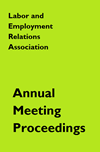Inequalities in Access to Justice in the Workplace
Abstract
This report examines variation in workplace dispute-resolution procedures and connects this variation to the issue of inequality in access to justice in the workplace. Variation in workplace dispute resolution in the United States is driven by a number of factors, including the narrowing coverage of union representation; differences in pressures for union substitution practices; variation in legal pressures on organizations; differences in conflict management strategies; and variation in human resource strategies. Examination of data from a 2003 survey of establishments in the telecommunications industry indicates that, even within a single industry, we can find wide variation in the structure, usage, and impact of workplace dispute-resolution procedures. Alternative policy options that might be pursued to reduce inequality in access to justice are examined, including development of a labor court system; mandatory requirements for workplace dispute-resolution procedures; and increasing legal incentives for the development of procedures.Downloads
Issue
Section
2005 Philadelphia, PA Proceedings

